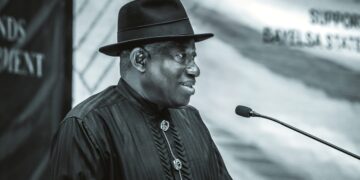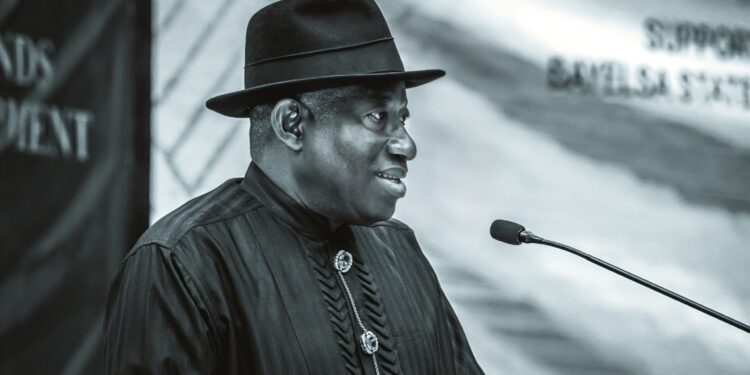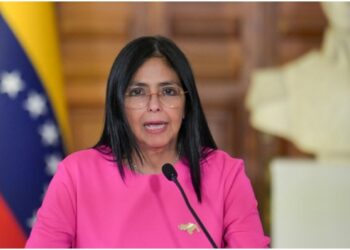By Emmanuel Nduka
Former Nigerian President Goodluck Jonathan has reflected on a time when the National Assembly demonstrated significant legislative power, including the ability to override presidential vetoes on major bills.
The ex-president’s strong remarks come amid concerns that the country’s leadership structure lacks a proper system of checks and balances, which is a fundamental requirement of the Presidential System of governance that it operates.
The current 10th National Assembly, and a few others before it, has been accused of merely “rubber-stamping” executive decisions.
Speaking on Wednesday at the Champions of Nigerian Content Awards Dinner in Yenagoa, Bayelsa State, Jonathan recounted the proactive role played by the legislature during his administration.
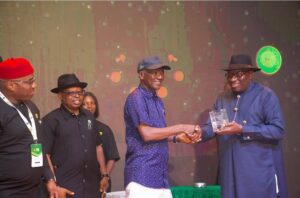
At the event in his home State where he was honoured with the ‘Nigerian Content Lifetime Achievement Award’, Jonathan recalled his experience with the Nigerian Oil and Gas Industry Content Bill, praising the Nigerian lawmakers who championed it—particularly Senator Lee Maeba of Rivers State, who sponsored the bill.
“When I was acting President in 2010, and the National Assembly presented the bill, I promptly signed it and we quickly established a monitoring body,” he reminisced, adding that Nigerian lawmakers like Senator Lee Maeba – the Nigerian Oil and Gas Industry Content Bill originator, and his group also deserve recognition. “That was a period when the National Assembly truly lived up to its name,” Jonathan added.
He also recalled the Assembly’s critical role in enacting the Niger Delta Development Commission (NDDC) Bill in 2000, despite opposition from the executive at the time.
“In 2000, the NDDC bill was also vetoed by the National Assembly. They overrode President Obasanjo’s refusal. Typically, in other countries, it is the President who vetoes bills,” Jonathan explained.
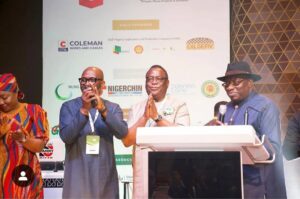
He emphasized the unique power of Nigeria’s legislature to enforce its will through legal provisions that allow it to override presidential inaction or rejection.
“If the President does not assent to a bill within 30 days, the National Assembly can reconvene and, with a two-thirds majority calculated by headcount—not voice vote—enact the bill into law,” he said.
Jonathan concluded by once again acknowledging Nigerian lawmakers like Senator Lee Maeba and his colleagues for their instrumental roles in passing both the Nigerian Content Act and the Niger Delta Development Commission Act. “I would like to use this opportunity to commend Lee Maeba and his team,” Jonathan restated.
Lack Of Courage In Current Parliament
Meanwhile, political stakeholders in the country, especially opposition members, have accused the current Sen. Godswill Akpabio-led National Assembly of being “rubber-stamp”.
This further casts doubts on the conscience of the National Assembly to legislatively engage with the executive, agreeing or disagreeing with legislations in the best interest of Nigerians that they represent.
Impacts Of The Nigerian Oil & Gas Industry Content Bill
Heritage Times HT reports that since the adoption of the Nigerian Oil and Gas Industry Content Bill in 2010, Nigeria’s Oil and Gas Local Content capacity has risen from 5% to 56% as at February 2025, enabling local firms to lead key industry projects.
The landmark legislation has further helped improve the capacity of Nigeria’s local Oil and Gas industry experts to compete at par with multinational Oil and Gas companies.
The success stories of the Nigerian Content Development and Monitoring Board (NCDMB) in championing Local Content in Africa’s Oil and Gas industry has seen oil-producing African countries come to understudy Nigeria’s delivery model, to adopt in their various countries.
Also, the African Local Content Roundtable created by the Nigerian Content Development and Monitoring Board, birthed the Africa Energy Bank (AEB) – a new multilateral financial institution established to address Africa’s energy financing gap, particularly in Oil, Gas, and Energy transition projects.
Under the pioneer leaderships of Dr. Ernest Nwapa, Arch. Denzil Amagbe Kentebe, Engr. Simbi Kesiye Wabote, and now Engr. Felix Omatsola Ogbe, the Nigerian Content Development and Monitoring Board has continued to experience steady growth.
The current Executive Secretary, Engr. Ogbe, is professionally consolidating on the achievements of his predecessors to steer the NCDMB and Nigeria’s Local Content agenda to greater heights.
